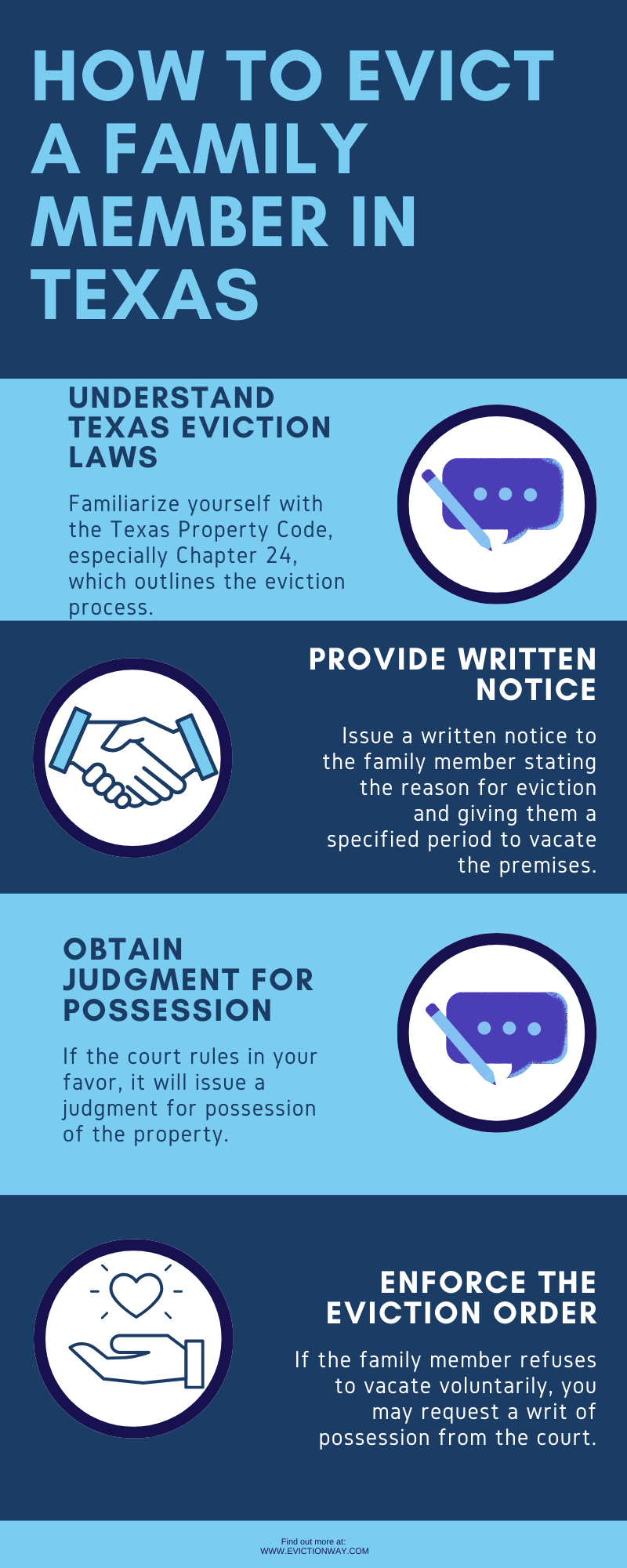If you need to evict a family member in Texas, this article is for you. We’ll share the best way to evict a family member in Texas, and we’ll tell you exactly how to do it.
We’ll also share tips on how to remove a family member politely, the laws involved, and legal tips. Evicting a family member can be a difficult and emotional process, but it’s important to know your rights and the steps you need to take.
This article will provide you with all the information you need to evict a family member in Texas. We’ll cover everything from the legal process to the practical steps you need to take. We’ll also provide tips on how to make the process as smooth and painless as possible.

How To Evict a Family Member In Texas
Evicting a family member can be a difficult and emotional process. However, it is important to remember that you have the right to protect your property and your family. If you are considering evicting a family member, it is important to follow the proper legal procedures.
1. Talk to Your Family Member
The first step is to talk to your family member about the situation. Explain why you are considering evicting them and give them a chance to respond. It is important to be clear and direct, but also to be respectful.
2. Give Written Notice
If you are unable to resolve the situation through conversation, you will need to give your family member written notice. The notice should state the reason for the eviction and the date by which they must vacate the property.

3. File a Lawsuit
If your family member does not vacate the property by the deadline, you will need to file a lawsuit. The lawsuit will ask the court to order your family member to leave the property.
4. Attend a Hearing
Once you have filed a lawsuit, you will need to attend a hearing. The hearing will give you an opportunity to present your case to the judge. The judge will then make a decision about whether or not to evict your family member.
5. Enforce the Judgment
If the judge orders your family member to leave the property, you will need to enforce the judgment. This may involve hiring a sheriff to remove your family member from the property.
6. Seek Professional Help
If you are struggling to evict a family member, it is important to seek professional help. An attorney can help you with the legal process and provide you with support.

How Much Does it Cost to Evict a Family Member in Texas?
Evicting a family member can be a difficult and expensive process. The cost of eviction will vary depending on the specific circumstances of the case, but there are some general costs that you can expect to incur.
| Cost Type | Estimated Cost Range | Notes |
|---|---|---|
| Court Filing Fees | $46 – $126 | Varies by county and the amount of rent due. |
| Process Server Fees | $75 – $125 per individual | Cost for serving the eviction notice and court documents. |
| Attorney Fees | $300 – $5,000+ | Depending on the complexity of the case and attorney rates. |
| Lost Rent | Varies with the rental value | Income lost during the eviction process. |
| Locksmith | $75 – $200 | If the locks need to be changed post-eviction. |
| Property Storage and Removal | $300 – $600+ | If the evicted party leaves belongings behind. |
| Additional Legal Costs | Varies | For miscellaneous expenses such as court motions or further actions. |
- Filing fees: The filing fee for an eviction lawsuit in Texas is $115.
- Service of process: The cost of serving the eviction notice to the tenant is typically around $50.
- Attorney fees: If you hire an attorney to represent you in the eviction process, you can expect to pay between $500 and $1,500.
- Court costs: If the case goes to trial, you may be responsible for paying court costs, which can range from $100 to $500.
FAQs: Evicting a Family Member in Texas
Here are some of the most frequently asked questions about evicting a family member in the Texas:
What are the legal grounds for evicting a family member in Texas?
In Texas, you can only evict a family member if they are not paying rent, have violated the lease agreement, or are engaging in illegal activity on the property.
What is the process for evicting a family member in Texas?
The process for evicting a family member in Texas is similar to the process for evicting any other tenant. You must give the family member a written notice to vacate, and if they do not leave by the deadline, you can file an eviction lawsuit with the court.
Can I evict a family member who is not on the lease?
Yes, you can evict a family member who is not on the lease. However, you will need to prove that they are living in the property without your permission.

What are some tips for evicting a family member peacefully?
There are a few things you can do to try to evict a family member peacefully. First, talk to them about your concerns and see if you can come to an agreement. If that doesn’t work, you can try mediation or counseling. As a last resort, you can file an eviction lawsuit.
What are the consequences of evicting a family member?
Evicting a family member can have a number of consequences, both for you and for the family member. It can damage your relationship, and it can also be expensive and time-consuming. It is important to weigh the pros and cons carefully before making a decision.
Related:
